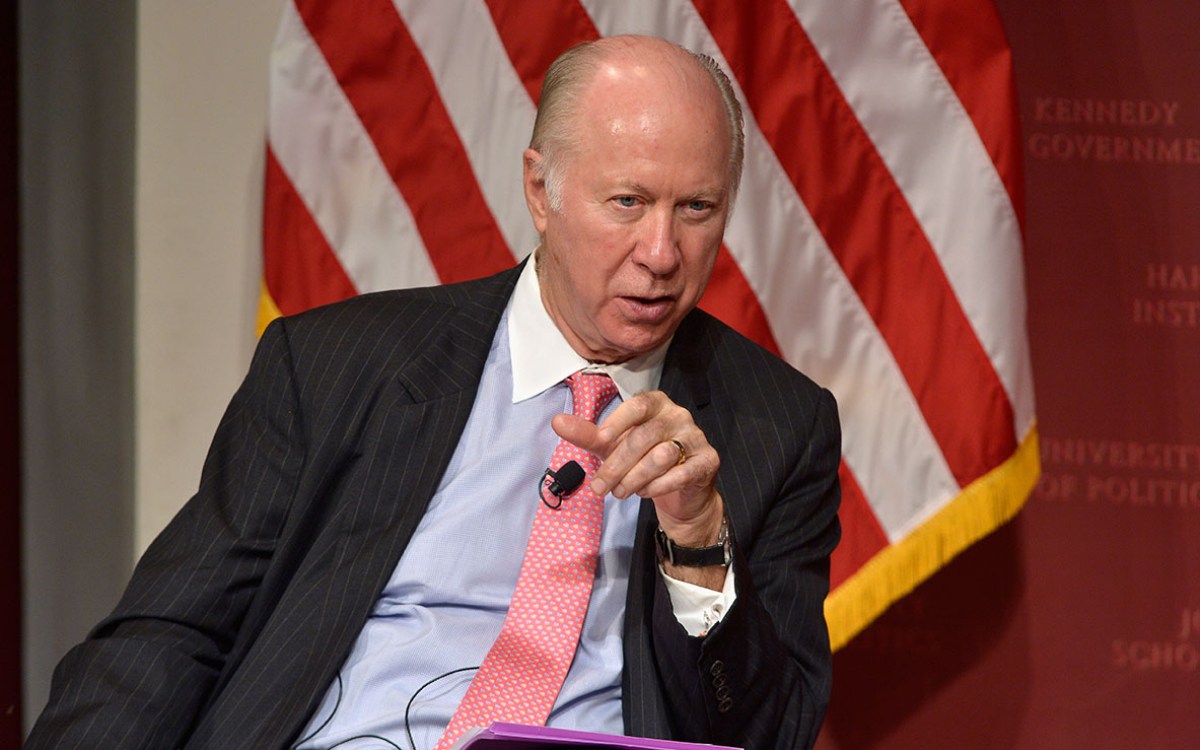Calderón cites nation’s progress
Mexican president surveys changes implemented since he took on challenging job
The election that put Felipe Calderón Hinojosa into office as the president of Mexico was a real squeaker — the closest vote in the modern history of his country.
It took a couple of months for the federal electoral tribunal to certify him as the winner. Even then his chief opponent wouldn’t concede. An hour before Calderón’s swearing in, leftist opposition lawmakers were throwing punches and even chairs in the legislative chamber, in an attempt to block his inauguration. The whole brawl was carried live on television across Mexico.
But that was then. This is now.
In the roughly 15 months since he has been in office, Calderón has racked up approval ratings around 65 percent and an impressive record of accomplishment, even by the standards of politicians who return to the Kennedy School of Government to tell an audience at the John F. Kennedy Jr. Forum how they have made good with their Harvard degree.
“We are absolutely committed to cleaning house,” he told his audience at the forum Monday (Feb. 11) evening. “If you see dust in the air, that’s a sign that we are cleaning up.”
He ticked off some of his administration’s achievements: “We have broken the political gridlock in Congress,” he said, and been able to pass a number of significant reforms in several areas: tax policy, electoral law, and pensions for civil servants.
On the drug issue, always of keen interest north of the border, he noted, “We have recovered areas of the country that were controlled by criminal gangs a few months ago.”
Last year was a record year for direct foreign investment, which was up 25 percent for 2007, and the second best ever year for job creation, with 800,000 new positions in the economy.
The numbers of Mexicans living in extreme poverty have been shrinking in recent years, from 34 million to 14 million, and the country’s position on indices of global competitiveness has been rising.
With a zero deficit in the federal budget and Mexican inflation running lower than that of the United States, Calderón proclaimed his goal of making Mexico “the best place in the world” to invest. He pointed to predictions that within a few decades — by 2040 — Mexico will be the world’s No. 5 economy and a net importer of labor.
“Every migrant that leaves Mexico is a loss to Mexico,” he said. “It’s possible to transform Mexico from a nation that loses its best people to migration into a nation capable of generating opportunity for Mexicans on their own soil.”
That transformation would remove Mexican illegal immigration as a political issue in the United States, where, Calderón suggested, his country is so often seen as “the enemy.”
Meanwhile, Mexico has been criticized for treating its own illegal immigrants from Guatemala and elsewhere in Central America as badly as it has accused the United States of treating undocumented Mexicans.
When a Guatemalan student in the audience raised this issue, Calderón defended Mexico’s right to enforce its own immigration laws but explained that his administration was starting a new policy, which he described as the “border of opportunity.”
He noted that Guatemalan workers provide benefits to the Mexican economy, just as Mexican workers benefit the U.S. economy. He stressed that the labor-intensive economy of Mexico and the capital-intensive economy of the United States are “absolutely complementary.”
He sketched out his administration’s efforts to improve the country’s infrastructure by boosting investment from 2 percent of gross domestic product per year to 5.5 percent, and to house Mexicans better with a program of low-cost housing loans. He also promised, “We are going to reach universal health care by the end of my administration.”
One weakness he acknowledged frankly was Mexico’s “very poor quality” educational system. This must be addressed by improving teacher salaries, among other things, he said. “We need to mobilize.”
Environmental protection has not been seen as Mexico’s long suit. But Mexico planted 250 million trees last year, he said — 25 percent of the goal of the United Nation’s “Billion Trees Campaign.”
Calderón also mentioned a program that protects the environment while providing a source of income for Mexico’s indigenous peoples by paying them to maintain or reforest woodlands and rain forests. Nearly a million and a half acres were reforested last year under this program.
In response to a request for advice to those with a passion for politics, Calderón counseled, “You need to believe strongly in the future of your country. … The task of the government on a daily basis is to work for a dream.”




